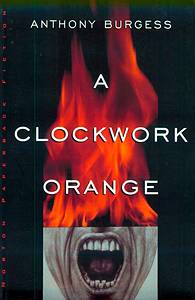|
NOVELIST AS COMPOSER

The life and times of Anthony Burgess,
by TESS CREBBIN
Today marks the eleventh anniversary of the death of Anthony Burgess, the British writer, linguist, poet, critic and composer.
Although Burgess remains best known for his novels (Earthly Powers, A Clockwork Orange, Kingdom of the Wicked etc) he was also an extremely talented and prolific composer and some of his works have been described as very Elgarian.

Anthony Burgess: 'A Clockwork Orange'. Book cover © Norton Paperback Fiction
|
Aside from writings by Burgess himself, especially This Man and Music, no book-length research has been published thus far about the man and his music but this will soon change with the arrival of a new book from an Ivy League music department. Paul Phillips of Brown University has been working for several years on the first comprehensive examination of Burgess as composer. The book, which is near completion, is titled A Clockwork Counterpoint: The Music and Literature of Anthony Burgess and scheduled for publication in 2005 by Manchester University Press.
Burgess's first love was music and the Manchester-born scribe did not plan on becoming a writer but aspired instead to being a composer. For this, he had all the talent if not the luck. Greatly influenced by his parents -- his mother was a singer and his father a pianist -- Burgess wrote his first symphony at age eighteen and continued to compose throughout his life. Now, thanks to Professor Phillips, it will soon be possible to learn more about the musical life of Burgess.
Phillips's quest began after he read Burgess's obituary in The New York Times, which detailed his musical accomplishments. When Phillips wrote to the novelist's literary publishers with a request to learn more about his musical compositions, initially he hit a dead end. Eventually he ascertained that most of the music was unpublished and still awaiting public discovery. By happenstance, in late 1996 a writer preparing a biography of Burgess was living in Rhode Island, where she attended several of Phillips's rehearsals at Brown. The writer soon put him in touch with Burgess's widow Liana and facilitated a trip by Phillips to Monaco in August 1997, where he was finally able to examine Burgess's compositions. 'Seeing the cabinet full of musical manuscripts when I arrived at the Burgess apartment was thrilling,' says Phillips. 'At that moment, I felt a great sense of discovery and knew that my trip had been worthwhile.'
In Monte Carlo, he examined some fifty compositions. From his research, Phillips believes that Burgess penned approximately 175 compositions, ranging from full symphonic works and operas to jazz and dance tunes. 'Most people know Anthony Burgess as a British novelist and essayist,' Phillips says, 'but he was also a very gifted composer who wrote a vast amount of music of all types, including orchestral, ballet and chamber music compositions.' Phillips discovered that Burgess was an eclectic composer whose music has two distinct sides -- popular tunes in the style of English music halls and vaudeville, and serious works influenced by Debussy, Stravinsky and the English school of Walton, Holst, Vaughan Williams and Elgar. Unfortunately, nearly everything that Burgess composed before 1970 has been lost or destroyed, but there remains a rich collection of compositions written during the last two decades of his life, including most of his finest works.
Continue >>
Copyright © 22 November 2004
Tess Crebbin, Germany

|

